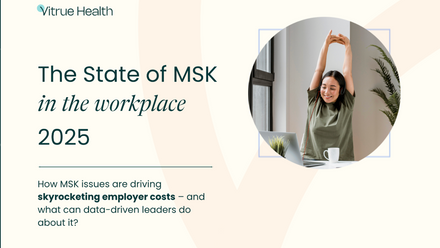Five ways employees can regain control of their physical health

A survey earlier this year by Public Health England revealed that the consecutive lockdowns had taken their toll on our physical health, with households across the country reverting to unhealthy eating habits and reducing the amount of exercise undertaken.
- One-third of people reported snacking on unhealthy food and drinks at least once a day, with data showing an increase of around 15% in sales of take home snack foods, including confectionery and biscuits.
- One-third said they were exercising less in the latter half of the year.
- 29% of smokers agreed they smoked more since the second national lockdown, attributing the change to being worried about their physical and mental health, and having money worries.
- 23% of drinkers (at least one unit a week) claimed that their alcohol intake has increased since the second lockdown – this is reflected in a 28% increase in take home alcohol sales compared to the previous year.
People are however keen to improve their health, with the survey finding that seven in 10 were motivated to make healthier lifestyle changes in 2021 due to coronavirus.
You can support your employees with regaining control of their physical health by encouraging the following:
Get moving
Being active can improve your physical wellbeing, and can also help you maintain a healthy immune system and a healthy mind.
For healthy adults, the recommendation is to complete a minimum of 150 minutes of moderate intensity exercise across the course of the week. Short duration, very vigorous exercise (around 75 minutes) can also bring equivalent health benefits, so you can choose the types of activities which best suit you and your lifestyle.
Remember: the greatest gains are seen in those who go from doing nothing to doing something. You don’t have to be an athlete, everything you do counts.
Build your strength
At least twice a week, all adults should also undertake activities which increase or maintain muscle strength (resistance training). The activities chosen should use the major muscle groups in the upper and lower body.
Daily activities that build strength can include stair climbing, carrying shopping bags, lifting and carrying children, and gardening. In a gym environment this can include activities such as using bodyweight, free weights, resistance machines or resistance bands.
Hydrate
Now is a great time to try out new habits such as drinking more water. You could start the day with a cup of hot water and a squeeze of lemon. Sparkling water is also a great choice if you enjoy the bubbles!
You may want to track your intake and use your urine colour as a trusty hydration indicator. Is your urine clear and pale? If not, you are not drinking enough water. The NHS urine chart can help you to work out if you are drinking enough or if you need to increase your fluid intake.
Avoid options with added sugar or sweeteners, or caffeinated drinks. Caffeine is a diuretic and causes you to lose water. Loss of hydration can reduce your concentration and thirst can be mistaken for hunger, leading to snacking.
Eat healthily
Refined, processed and sugary snacks can compromise immune function, so simple swaps to fruit, vegetables, nuts and seeds are a great way to also get more antioxidants in your diet, which also reduces inflammation in the body.
Certain nutritional steps can boost your feelings of energy and vigour, if you are feeling sluggish due to a sedentary lifestyle or unhealthy eating. Have a look at our article on nutrition tips for boosting energy for more tips to increase your energy levels.
You could also check out our simple store cupboard recipes, which can provide inspiration to kickstart your healthy eating.
Wake up to sleep
Being confined to home with disrupted routines and using artificial light and screens for work, communication and entertainment has played havoc with our body clocks, and the country is now having trouble sleeping.
A staggering 50% of the UK population report that their sleep has been disturbed due to Covid-19 and the number of people experiencing insomnia has risen to one in four. Google searches for the word “insomnia” have also surged significantly, with searches peaking around 3am.
It is vital for health to maintain a regular sleep routine and good sleep hygiene. The quality and quantity of sleep impacts your physical health, mental resilience and immune function. Take a look at our list of sleep articles to help reset your body clock and bedtime habits.
For more insights on this topic, check out our panel discussion ‘Is sedentary behaviour the next big health risk?’ where clinical and fitness experts came together to discuss the clinical risks associated with a sedentary lifestyle and how employers can encourage their employees to move more.
This article is provided by Nuffield Health.
Supplied by REBA Associate Member, Nuffield Health
Nuffield Health are the UK's largest healthcare charity & the market leader in corporate healthcare.







